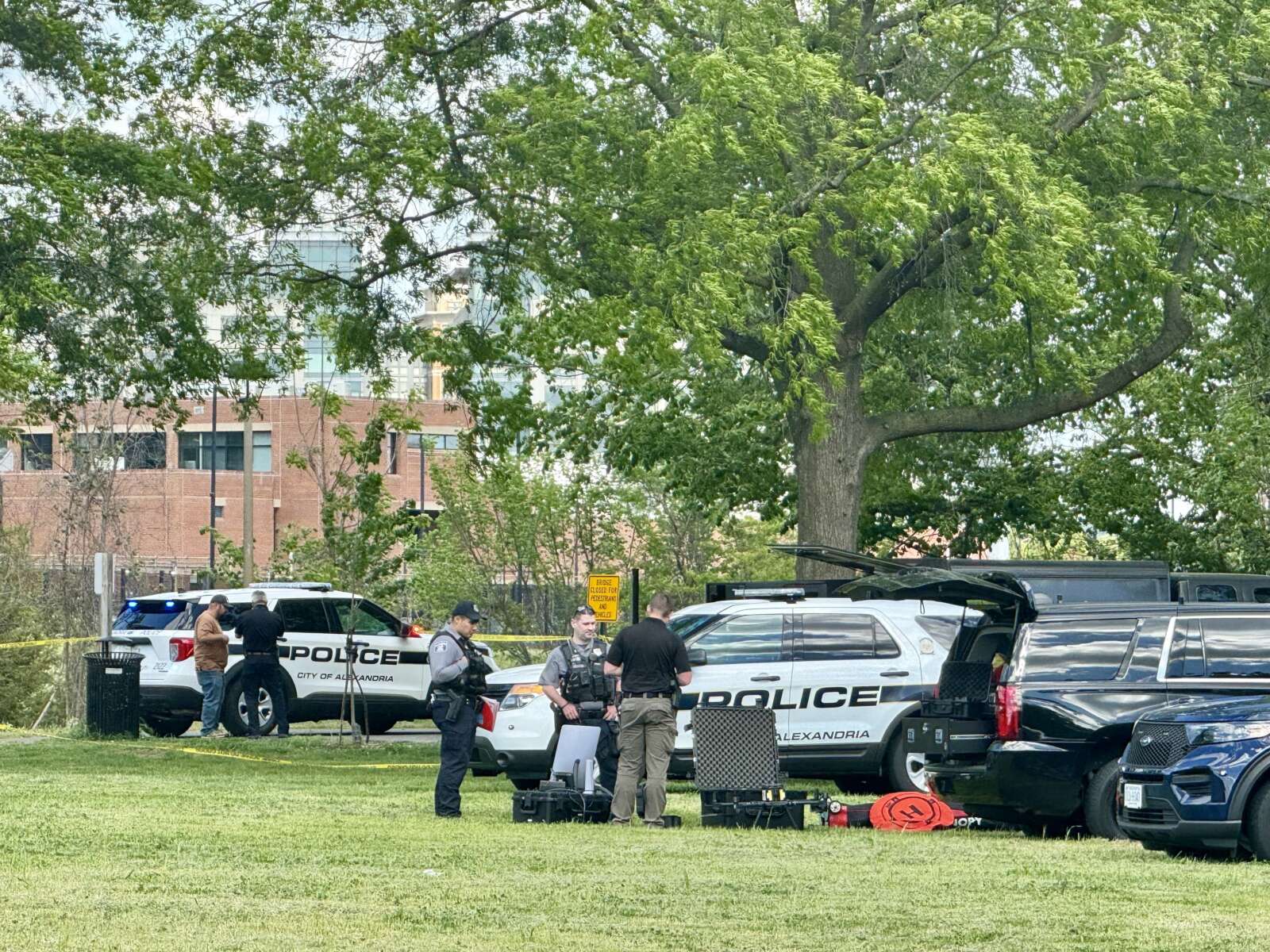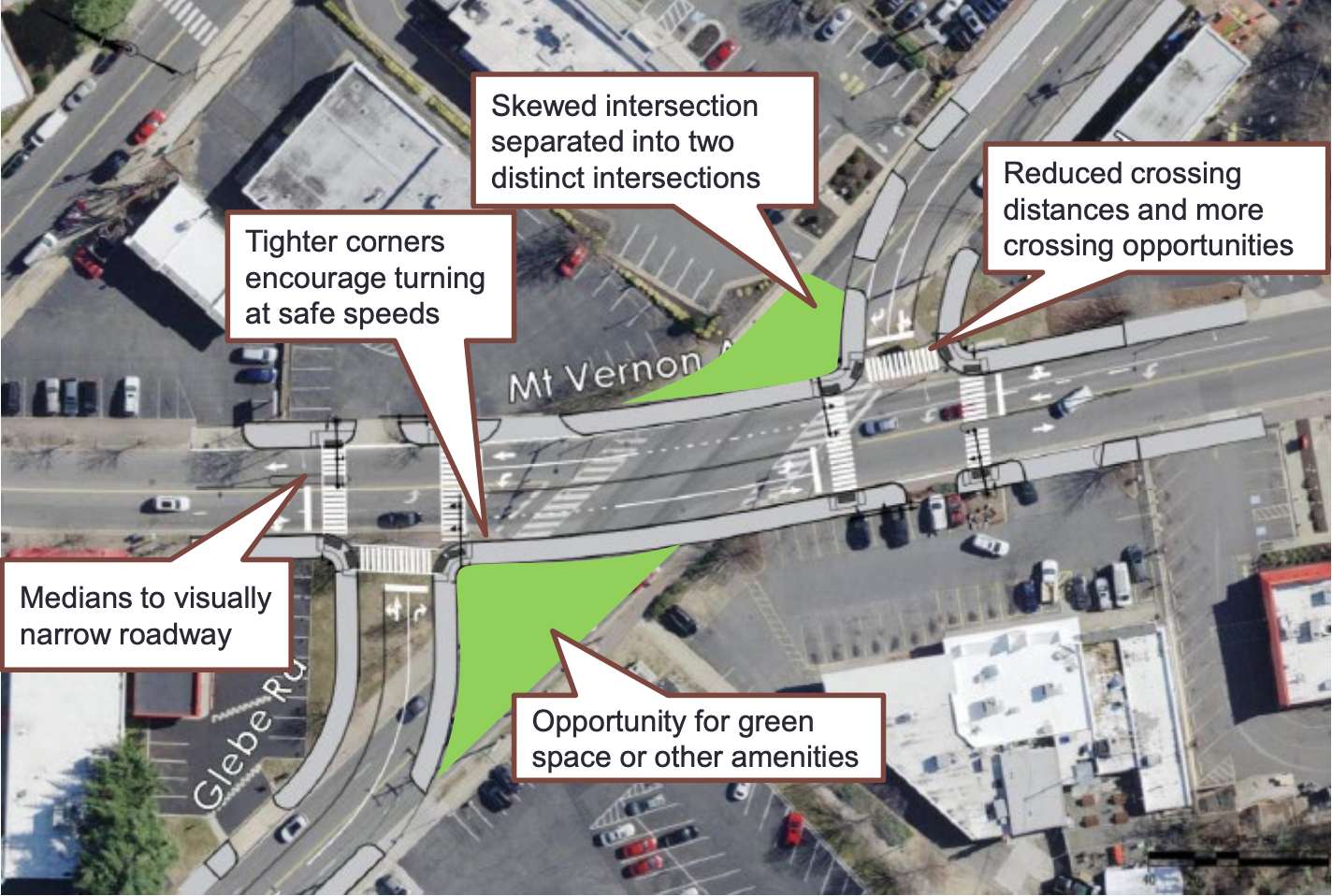The controversial vote to slim down Seminary Road may have passed, but the arguments over Complete Streets and the program’s future in Alexandria are just getting started.
At Agenda Alexandria, a group that meets monthly to discuss the top issues affecting Alexandria with a panel of experts, advocates on every side of the issue clashed over whether the “dieting” of Seminary Road was necessary and what the future holds for major Alexandria streets. At the group’s Sept. 23 meeting, a city official argued with local residents not just over the new bike lanes, but over changes to Alexandria’s transportation policies.
“Our paradigm in the past has been exclusively through the windshield,” said Nate Macek, chair of the Planning Commission. “Complete streets is about looking at [roads] for all users.”
Macek argued the Complete Streets program, which replaces some motorized travel lanes with extended sidewalks and bike lanes, right-sizes road infrastructure to cater to all modes of transportation.
“Complete streets are about roads for everyone, whether that’s biking, walking, or driving,” said Josephine Liu, vice-chair of the Alexandria Bicycle and Pedestrian Advisory Committee. “That’s also all ages: children, adults, senior citizens and people who may not be able-bodied.”
But for others, the Complete Streets program is a punitive measure against cars that disproportionately favors bicycles.
“It’s about reorienting the streetscape to accommodate every user,” John Townsend, Manager of Public and Government Relations for AAA Mid-Atlantic. “That’s what it is on paper, but oftentimes it doesn’t work out that way. It gives pride of place to certain modes of transportation and that becomes the inherent problem. There’s nothing wrong with accommodating the streetscape to make them safer or accommodate the maximum number of people, but it comes down to making choices and those choices involve who is in and who is out.”
Townsend argued that in terms of voices on the Complete Streets decision-making, cars are “the low person on the totem pole.” Drivers don’t have the same collective voice in city policy that cyclists do and thus their problems — like gridlock — get left by the wayside, Townsend said.
“There is a fanatic minority who want to get people out of cars, lower the speed limits and reduce the size of roads,” agreed Jack Sullivan, former president of the Seminary Hill Association. “They are being heard in the towers of power.”
While the conversation started with Complete Streets on Seminary Road, critics of the plan drove the discussion to other transportation issues across the city. Townsend argued the slimming down of Seminary Road is just a symptom of a broader problem: that transportation planners don’t account for real-world circumstances.
“The one size fits all approach to planning that comes out of the West Coast, goes to the District of Columbia, and then we try to make it fit in Alexandria,” Townsend said. “These planners stay in college and they lay on the grass and they smoke grass and they don’t know how real people live.”
Townsend pointed to city policies like reducing the number of parking spaces businesses are required to provide as another example of this.
“Walmart doesn’t build for Wednesday night, they build for the Thanksgiving and Christmas rush,” Townsend said.
Macek shot back that planners looked at parking conditions across multiple seasons, days of the week, and times of the day.
“One of the things our studies found was… people weren’t using the parking we were requiring people to build, which adds a really extensive cost when you require developers to put that parking underground,” Macek said. “We had cases where half the parking being built wasn’t being used on a daily basis.”
Macek pointed specifically to the Trader Joe’s and Harris Teeter in Old Town, where he said the developers were required to build a half-floor of underground parking that’s rarely used.
Liu, of the Bicycle and Pedestrian Advisory Committee, was presed about what cyclists contribute to Alexandria, compared to drivers who pay taxes for their vehicles. Liu responded by saying that bicycles are a good in and of themselves for Alexandria, and will be increasingly necessary to mitigate traffic congestion and environmental impacts as the sleepy residential corners of the city become more urbanized.
“Every time I get on my bike instead of using the car, I’m not putting wear and tear on the road,” Liu said. “I’m not putting greenhouse gases in the air. There’s no gas coming from my tailpipe. When I bike to Trader Joe’s that’s one more space for someone else to park. We’re a growing city. We have to figure out how to fit more people without taking up as much space and that’s more possible when more people are taking bikes and transit.”
Recent Stories

For many remote workers, a messy home is distracting.
You’re getting pulled into meetings, and your unread emails keep ticking up. But you can’t focus because pet hair tumbleweeds keep floating across the floor, your desk has a fine layer of dust and you keep your video off in meetings so no one sees the chaos behind you.
It’s no secret a dirty home is distracting and even adds stress to your life. And who has the energy to clean after work? That’s why it’s smart to enlist the help of professionals, like Well-Paid Maids.

Monarch Montessori School is now enrolling infants, toddlers and three year-olds for its full-time Montessori program. We offer a seamless enrollment process which involves submitting an application for review, paying the enrollment fee and submitting the remaining enrollment materials before your proposed start date.
At Monarch Montessori School, we aim to provide an authentic Montessori learning experience. At our Alexandria location, we currently have 8 openings in our Primary classroom (ages 3-6), and 6 openings in our Toddler classroom. Additionally, there are 3 infant openings at this time.
Our first floor space is an open concept. Infants and toddlers share the same large classroom. Children ages 3-6 are in two classrooms on our second floor. Each classroom has one lead and assistant guide. We offer a year-round program, with intermittent breaks for Spring Break and Winter Break.
Scholarship Fund of Alexandria Annual Gala & Auction
Do good while having a good time at the Scholarship Fund of Alexandria’s 38th Annual Gala and Auction at the Hilton Alexandria Mark Center. The fun begins with a 2-hour open bar reception while mingling with 499 other Alexandrians who






